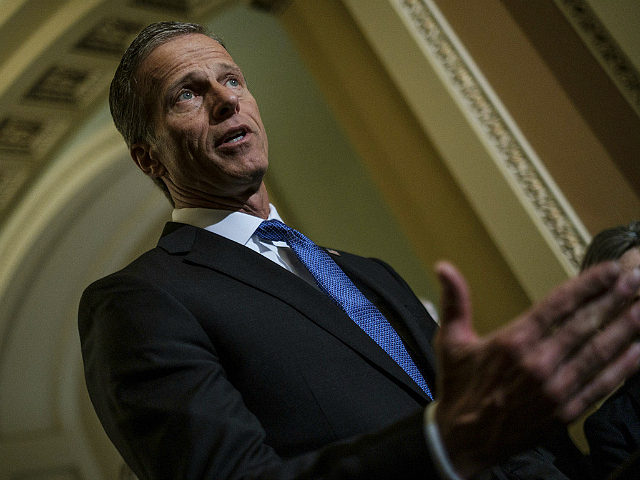Sen. John Thune (R-SD), an establishment Republican who once urged Donald Trump to drop out of the 2016 presidential race, is slow-walking a Trump nominee to the FCC whose confirmation is critical to tackling Big Tech censorship.
A petition currently before the Federal Communications Committee (FCC) asks the committee to narrow the bounds of Section 230 of the Communications Decency Act, a bill that allows tech companies to censor their users with little risk of legal blowback.
The petition is a crucial element of President Trump’s executive order on social media censorship, which aims to combat Big Tech’s well-documented viewpoint discrimination.
But the FCC, which has five members including Chairman Ajit Pai, is currently down one commissioner.
Obama-appointed commissioner Michael O’Rielly was up for renomination, but President Trump wisely declined to renominate him after O’Rielly — nominally a Republican — suggested that he would oppose the president’s executive order, saying tech monopolies are still “First Amendment protected entities.”
O’Rielly may or may not be right about that, but the First Amendment does not entitle corporations to the protections of Section 230, a law that grants tech platforms specific legal protections that no other type of company enjoys.
After O’Rielly’s comments, President Trump withdrew his nomination, instead choosing to nominate Nathan Simington, currently an adviser in the National Telecommunications and Information Administration.
But Sen. Thune, the Senate Majority Whip and chairman of the Senate Commerce Subcommittee on Communications, Technology, Innovation, and the Internet, is demanding Trump renominate O’Rielly, who has said he will protect Big Tech’s “First Amendment” right to censor the internet.
Bringing O’Rielly back “would be the simplest thing to do,” Thune recently told a reporter. “Hopefully … they’ll come to that realization.”
Thune said he will “move forward” with Simington as the FCC nominee if that remains Trump’s wish, “but I think [the White House will] have to deal with the reality that it’s unlikely that we can get through this process before” the election.
There is, in fact, enough time for Simington to be approved by the Senate before the election. But Thune’s comments imply that he intends to slow-walk the process of confirming a commissioner who might actually use his power to rein in Big Tech bias.
If Biden wins, O’Rielly can be renominated and the tech companies will not have to deal with the risk of a hostile FCC.
Much will depend on the actions of Sen. Roger Wicker (R-MS), Chairman of the Senate Commerce Committee. Should Sen. Wicker fail to use next week to schedule a hearing, he will effectively delay the confirmation until after the election.
In a comment to Breitbart News, Chairman Wicker said, “the President has underscored the importance of this nomination, and I hope the Committee will move expeditiously.”
Sen. Thune’s office did not provide a comment for this article but did indicate that Sen. Thune recognizes the FCC commissioner is a critical role.
Sen. Thune was one of the most anti-Trump establishment Republicans in 2015 and 2016. Alongside Justin Amash and other establishment Republicans, he urged the president to drop out of the race in October 2016, after the release of the Access Hollywood tape.
Despite chairing the Senate’s influential subcommittee on Communications, Technology, Innovation and the Internet, Sen. Thune let Democrats lead the way in 2018, when he agreed to a joint congressional hearing with Facebook CEO Mark Zuckerberg over the “scandal” of Trump campaign contractors accessing Facebook data in 2016, even though the Obama campaign had been given access to far more data in 2012 with very little outcry.
At that hearing, instead of asking Zuckerberg why Facebook hasn’t turned over decisions on filtering constitutionally protected content to their users (like Google’s “safe search” button), Sen. Thune publicly conceded to Zuckerberg that there was a “line between legitimate political discourse and hate speech,” that could be “hard to identify.”
Despite growing reports of censorship against Republicans on social media, Sen. Thune even went so far as to praise the Facebook CEO, calling his story an example of the “American Dream,” adding that “many are incredibly inspired by what you’ve done.”
It fell to Sen. Cruz (R-TX) to raise the issue of Section 230, needling Zuckerberg on what he described as a “pervasive pattern of bias and political censorship.” The widely-shared exchange resulted in Zuckerberg sheepishly acknowledging that Silicon Valley is an “extremely left-leaning place.”
The only Section 230 reform supported by Sen. Thune is a bill that would allow tech companies to continue censoring constitutionally protected speech without offering any legal recourse to censored users. The only change is that tech companies would be subject to transparency requirements around censorship.
President Trump’s executive order goes considerably further than that, asking the FCC to reinterpret the bounds of Section 230 altogether. It is that order that will require the attention of the new FCC commissioner.
And it is that proposed new FCC commissioner that Sen. Thune has suggested will be slow-walked until after the election — unless the Republican base makes its voice heard right now.
UPDATE: Following the publication of this piece, a spokesman for Sen. Thune strongly denied that the Senator is trying to delay Simington’s confirmation in any way. Sen. Thune now supports moving forward “as soon as possible” to confirm Trump’s FCC pick.
“If Chairman Wicker, who … controls the committee agenda, schedules a hearing and Leader McConnell, who controls the floor schedule, puts him on the floor before the election, he would support the nomination, and he’s in no way ‘slow-walking’ it,” said the spokesman.
Allum Bokhari is the senior technology correspondent at Breitbart News. His upcoming book, #DELETED: Big Tech’s Battle to Erase the Trump Movement and Steal The Election, which contains exclusive interviews with sources inside Google, Facebook, and other tech companies, will be released on September 22 and is currently available for preorder.

COMMENTS
Please let us know if you're having issues with commenting.